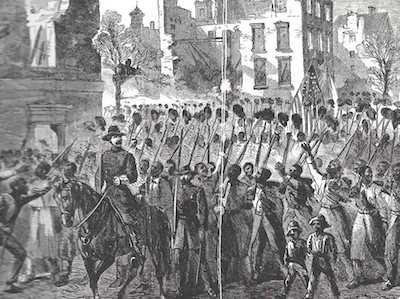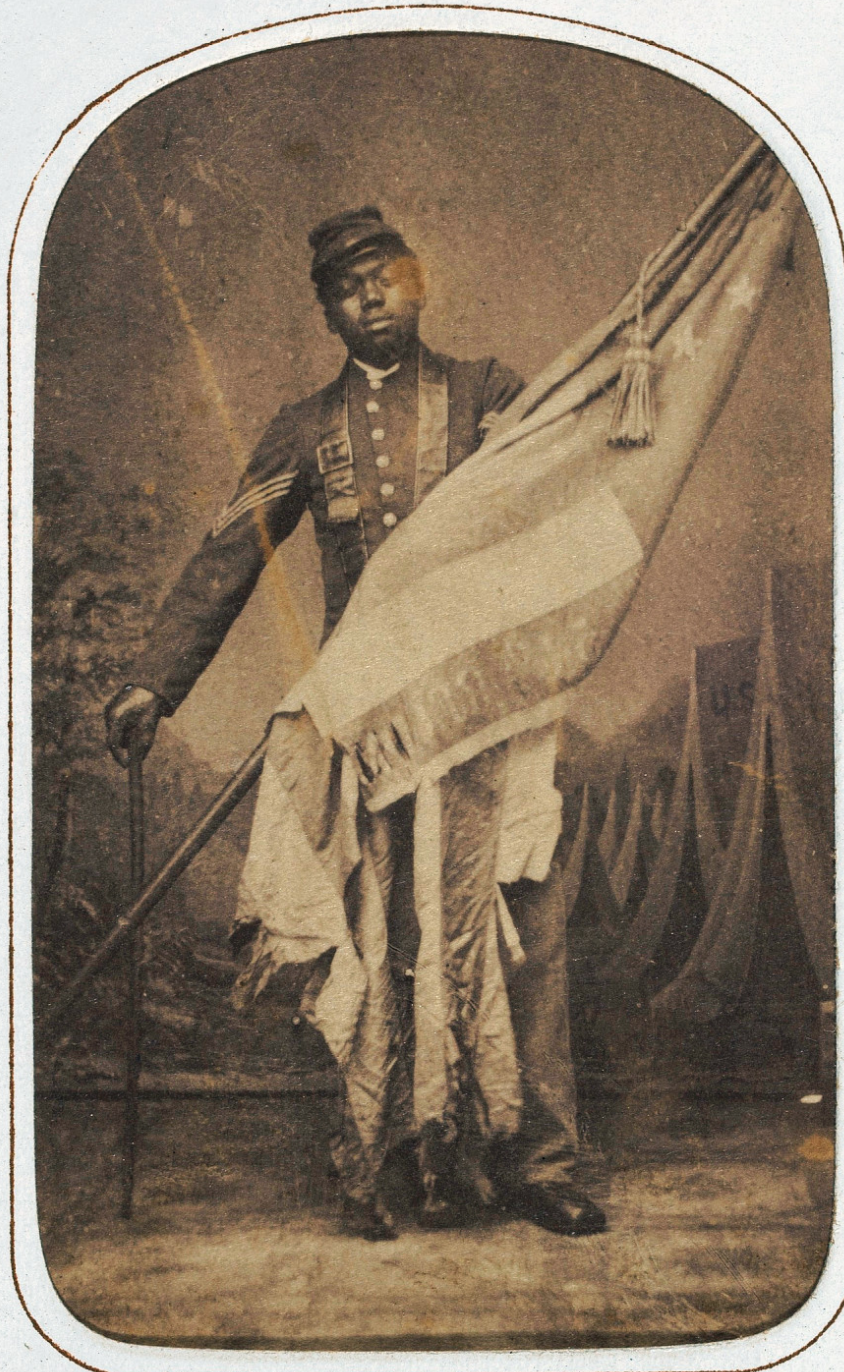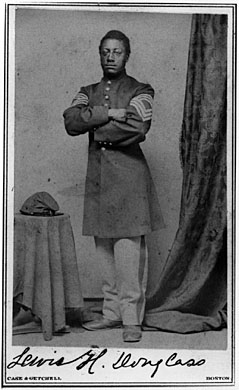"The success of the raid, which had also included the brave service of African-American soldiers, increased Tubman’s fame, and she went on to work on similar missions with the famed Massachusetts 54th Infantry before spending the final years of the war tending to injured soldiers. One hundred years after Tubman’s successes in South Carolina, a recently formed black feminist group took the name Combahee River Collective in her honor, also paying honor to Tubman’s work later in her life as a powerful advocate for women’s suffrage." — from History.com
The Battles of the 54th Massachuttes
Off to War!
"The march of the regiment through the city was attended with the most enthusiastic cheering.”
~ Philadelphia Inquirer
29 May 1863

Harpers Weekly~ March 18, 1865 ~ Wood Engraving of Colonel Charles Fox Leading the 55th Massachusetts Infantry Regiment into Charleston, S.C. HarpWeek.com.
The battles that the 54th Massachusetts fought were not just physical but racial. They had to prove that they were equal to their white counterparts. Though they fought many battles the racial ones were the hardest.
Battles
Participated in the Raid on Combahee Ferry on June 1 and 2, 1863
Participated in the Battle of Grimball's Landing on July 16, 1863
- 14 men killed; 17 wounded; 12 captured
- little sleep, food or water
- praised for saving the 10th Connecticut Infantry
Led the attack on Fort Wagner, July 18, 1863
This Second Battle of Fort Wagner was their most famous battle.
- lost almost half of their men
- showed extreme bravery but they were turned back
- Col. Shaw killed
Model of Fort Wagner
From the National Archives.
Participated in the Battle of Olustee in Florida, February 20, 1864
Skirmishes with Confederate Army at James Island, July 1, 1864
- 50 men suffered from the heat; Private John Hale died from heat exposure.
18 April 1865, Battle of Boykin's Mill
- One of the last engagements of the war; two men killed and 12 wounded.
- Patrol and guard duty in Charleston until July 11, 1865 when they were mustered out.
"It was a supreme moment for the Fifty-fourth, then under fire as a regiment for the first time. The sight of the wounded comrades had been a trial; and the screaming shot and shell flying overhead, cutting the branches of trees to the right, had a deadly sound. But the dark line stood staunch, holding the front at the most vital point. Not a man out of place, as the officers could see while they stood in rear of the line, observing the men." ~Whitehair, 41, quoting Captain Louis Emilio's history.
Col. Shaw told his men "the eyes of thousands would look upon the night's work they were about to enter on; and said he, 'Now boys I want you to be MEN!" ~Shaw quoted in Whitehair, 51.
Sgt William H Carney retrieved the colors and carried the flag to the end. "As he crawled off the battlefield he held the flag aloft until comrades came to his assistance, and he greeted them with the words often quoted in Massachusetts, 'The old flag never touched the ground.'" ~Whitehair, 120.
"The Fifty-fourth did well and nobly; only the fall of Colonel Shaw prevented them from entering the fort. They moved up as gallantly as any troops could, and with their enthusiasm they deserved a better fate." Letter to Gov Andrew, July 22, 1863. ~Whitehair, 68).
General Seymour said "the day was lost and everything depended on the Fifty-fourth." Seymour quoted in Whitehair, 132.
One 54th soldier wrote, "There is not a shadow of a doubt that the enemy knew our number and purposes perfectly well, and calmly awaited our approach and whipped us completely." ~Sgt George Stephens quoted in Whitehair, 135.
"The troops generally fought with desperation. When it became impossible to hold the ground, the first North Carolina, colored, and the Fifty-fourth, of fighting memory, were brought up to cover the retreat; and manfully did they do it. The Fifty-fourth gave one demonic yell, and then both these regiments for more than one hour fought with the bayonet, like infuriated dogs, until the retreat was secured." ~1864 Letter cited in Whitehair, 159.
"A memorable day for the regiment because of the trials, requiring not only courage, but also the constant suffering and endurance from the oppressive heat." ~Whitehair, 178.
"steadiness and soldierly conduct"
~Brig. General Alfred Terry after the Battle of Grimball's Landing, quoted in Whitehair, 42.
Siege of Fort Wagner
- Despite not being able to take the Fort, the 54th was hailed for its courage, bravery and determination during the battle.
- This battle encouraged more enlistment and mobilization of African-American troops.
- Sergeant William Harvey Carney was awarded the Medal of Honor for grabbing the U.S. flag as the flag bearer fell.
- He carried the flag to the enemy ramparts and back.
- This was the first Medal of Honor given to an African American.
- His citation said, "When the color sergeant was shot down, [Carney] grasped the flag, led the way to the parapets, and planted the colors thereon. When the troops fell back he brought off the flag, under a fierce fire in which he was severely wounded." ~Citation, Congressional Medal of Honor Organization, CMOHS.org.

William Harvey Carney and colors, circa 1864
United States Department of Defense
The 54th regiment were good soldiers. More than 178,000 African Americans served in the Union Army. There were several times the 54th only had a few days of sleep before they had to fight.
Faces of the 54th Massachusetts Infantry
The Impact
The Formation


